ETHICS 4: [Year] Ethical Dilemma Assignment - Student's Solutions
VerifiedAdded on 2022/08/21
|6
|1202
|17
Homework Assignment
AI Summary
This document presents a student's responses to an ETHICS 4 assignment on ethical dilemmas. The assignment explores a range of philosophical concepts, including fatalism, determinism, relativism, and moral luck. The answers address questions about these concepts, providing definitions, explanations, and examples. Key thinkers like Thomas Nagel, Immanuel Kant, and Jean-Paul Sartre are referenced. The student analyzes topics such as contra-causal free will, existentialism, and moral absolutism, offering insights into the complexities of ethical decision-making. The assignment is designed to test the student's understanding of various ethical frameworks and their ability to apply these frameworks to real-world scenarios. The responses demonstrate a grasp of the core philosophical ideas discussed in the course and offer critical analysis of each concept.

[Year]
Ethical Dilemma
Student’s Details
Ethical Dilemma
Student’s Details
Paraphrase This Document
Need a fresh take? Get an instant paraphrase of this document with our AI Paraphraser
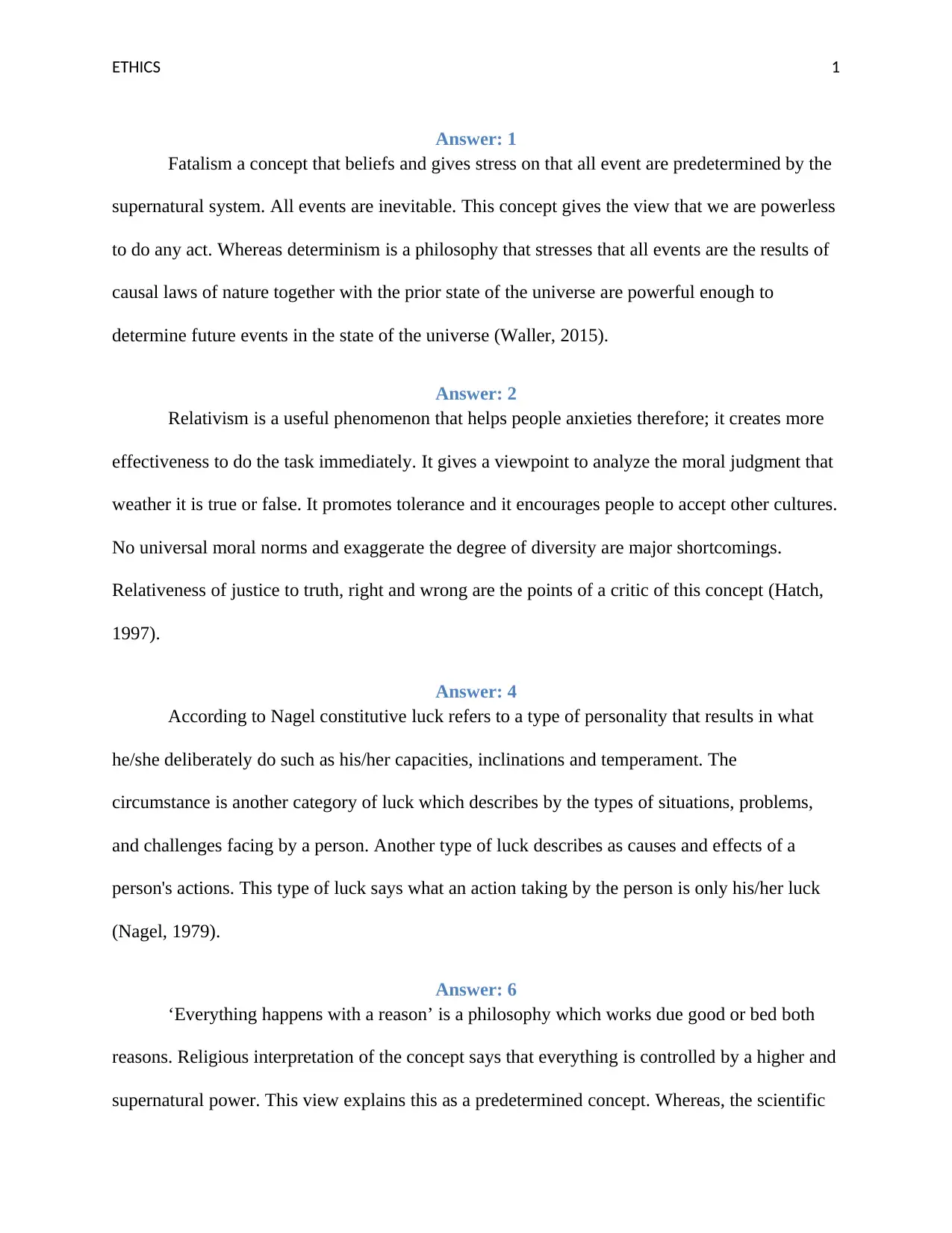
ETHICS 1
Answer: 1
Fatalism a concept that beliefs and gives stress on that all event are predetermined by the
supernatural system. All events are inevitable. This concept gives the view that we are powerless
to do any act. Whereas determinism is a philosophy that stresses that all events are the results of
causal laws of nature together with the prior state of the universe are powerful enough to
determine future events in the state of the universe (Waller, 2015).
Answer: 2
Relativism is a useful phenomenon that helps people anxieties therefore; it creates more
effectiveness to do the task immediately. It gives a viewpoint to analyze the moral judgment that
weather it is true or false. It promotes tolerance and it encourages people to accept other cultures.
No universal moral norms and exaggerate the degree of diversity are major shortcomings.
Relativeness of justice to truth, right and wrong are the points of a critic of this concept (Hatch,
1997).
Answer: 4
According to Nagel constitutive luck refers to a type of personality that results in what
he/she deliberately do such as his/her capacities, inclinations and temperament. The
circumstance is another category of luck which describes by the types of situations, problems,
and challenges facing by a person. Another type of luck describes as causes and effects of a
person's actions. This type of luck says what an action taking by the person is only his/her luck
(Nagel, 1979).
Answer: 6
‘Everything happens with a reason’ is a philosophy which works due good or bed both
reasons. Religious interpretation of the concept says that everything is controlled by a higher and
supernatural power. This view explains this as a predetermined concept. Whereas, the scientific
Answer: 1
Fatalism a concept that beliefs and gives stress on that all event are predetermined by the
supernatural system. All events are inevitable. This concept gives the view that we are powerless
to do any act. Whereas determinism is a philosophy that stresses that all events are the results of
causal laws of nature together with the prior state of the universe are powerful enough to
determine future events in the state of the universe (Waller, 2015).
Answer: 2
Relativism is a useful phenomenon that helps people anxieties therefore; it creates more
effectiveness to do the task immediately. It gives a viewpoint to analyze the moral judgment that
weather it is true or false. It promotes tolerance and it encourages people to accept other cultures.
No universal moral norms and exaggerate the degree of diversity are major shortcomings.
Relativeness of justice to truth, right and wrong are the points of a critic of this concept (Hatch,
1997).
Answer: 4
According to Nagel constitutive luck refers to a type of personality that results in what
he/she deliberately do such as his/her capacities, inclinations and temperament. The
circumstance is another category of luck which describes by the types of situations, problems,
and challenges facing by a person. Another type of luck describes as causes and effects of a
person's actions. This type of luck says what an action taking by the person is only his/her luck
(Nagel, 1979).
Answer: 6
‘Everything happens with a reason’ is a philosophy which works due good or bed both
reasons. Religious interpretation of the concept says that everything is controlled by a higher and
supernatural power. This view explains this as a predetermined concept. Whereas, the scientific
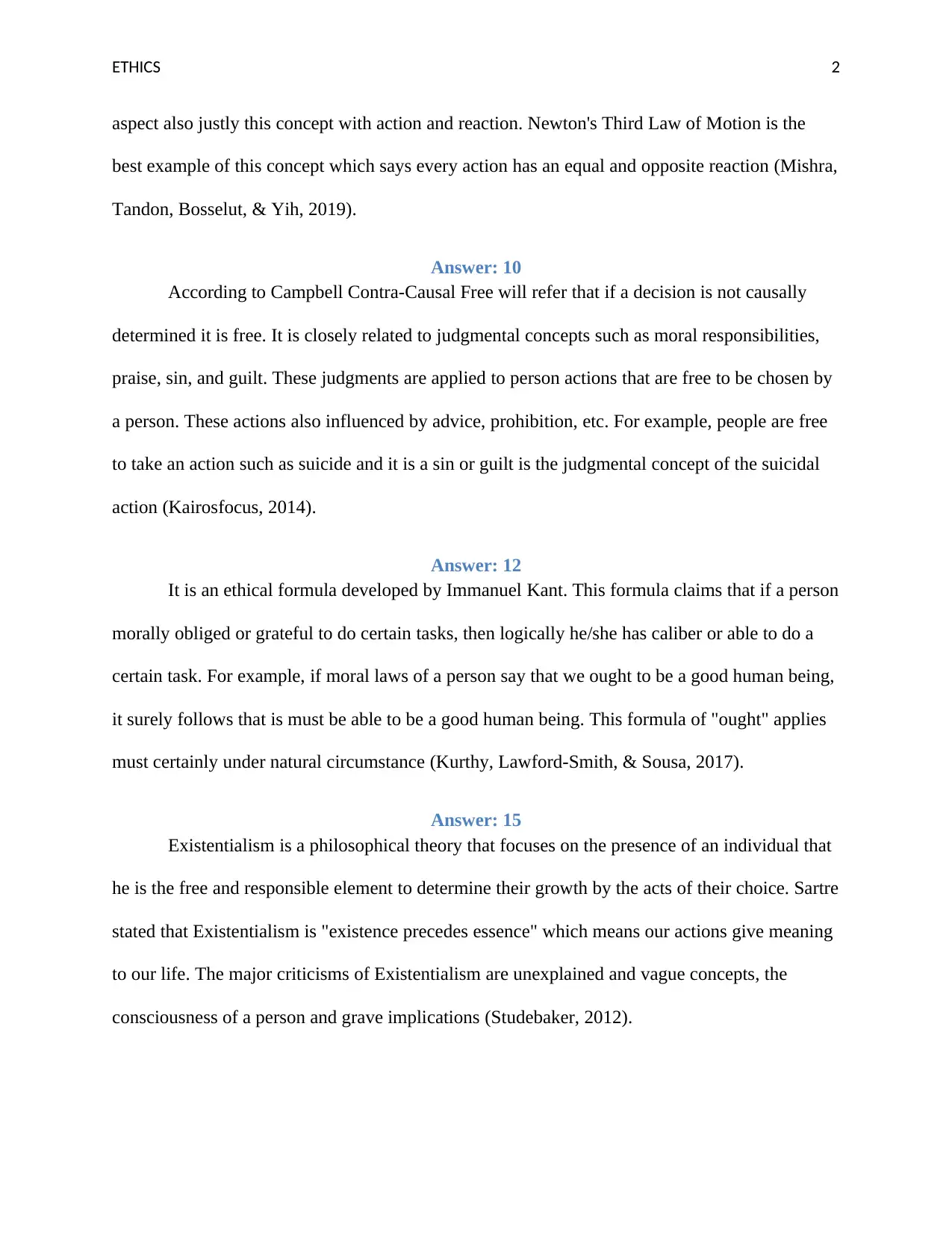
ETHICS 2
aspect also justly this concept with action and reaction. Newton's Third Law of Motion is the
best example of this concept which says every action has an equal and opposite reaction (Mishra,
Tandon, Bosselut, & Yih, 2019).
Answer: 10
According to Campbell Contra-Causal Free will refer that if a decision is not causally
determined it is free. It is closely related to judgmental concepts such as moral responsibilities,
praise, sin, and guilt. These judgments are applied to person actions that are free to be chosen by
a person. These actions also influenced by advice, prohibition, etc. For example, people are free
to take an action such as suicide and it is a sin or guilt is the judgmental concept of the suicidal
action (Kairosfocus, 2014).
Answer: 12
It is an ethical formula developed by Immanuel Kant. This formula claims that if a person
morally obliged or grateful to do certain tasks, then logically he/she has caliber or able to do a
certain task. For example, if moral laws of a person say that we ought to be a good human being,
it surely follows that is must be able to be a good human being. This formula of "ought" applies
must certainly under natural circumstance (Kurthy, Lawford-Smith, & Sousa, 2017).
Answer: 15
Existentialism is a philosophical theory that focuses on the presence of an individual that
he is the free and responsible element to determine their growth by the acts of their choice. Sartre
stated that Existentialism is "existence precedes essence" which means our actions give meaning
to our life. The major criticisms of Existentialism are unexplained and vague concepts, the
consciousness of a person and grave implications (Studebaker, 2012).
aspect also justly this concept with action and reaction. Newton's Third Law of Motion is the
best example of this concept which says every action has an equal and opposite reaction (Mishra,
Tandon, Bosselut, & Yih, 2019).
Answer: 10
According to Campbell Contra-Causal Free will refer that if a decision is not causally
determined it is free. It is closely related to judgmental concepts such as moral responsibilities,
praise, sin, and guilt. These judgments are applied to person actions that are free to be chosen by
a person. These actions also influenced by advice, prohibition, etc. For example, people are free
to take an action such as suicide and it is a sin or guilt is the judgmental concept of the suicidal
action (Kairosfocus, 2014).
Answer: 12
It is an ethical formula developed by Immanuel Kant. This formula claims that if a person
morally obliged or grateful to do certain tasks, then logically he/she has caliber or able to do a
certain task. For example, if moral laws of a person say that we ought to be a good human being,
it surely follows that is must be able to be a good human being. This formula of "ought" applies
must certainly under natural circumstance (Kurthy, Lawford-Smith, & Sousa, 2017).
Answer: 15
Existentialism is a philosophical theory that focuses on the presence of an individual that
he is the free and responsible element to determine their growth by the acts of their choice. Sartre
stated that Existentialism is "existence precedes essence" which means our actions give meaning
to our life. The major criticisms of Existentialism are unexplained and vague concepts, the
consciousness of a person and grave implications (Studebaker, 2012).
⊘ This is a preview!⊘
Do you want full access?
Subscribe today to unlock all pages.

Trusted by 1+ million students worldwide
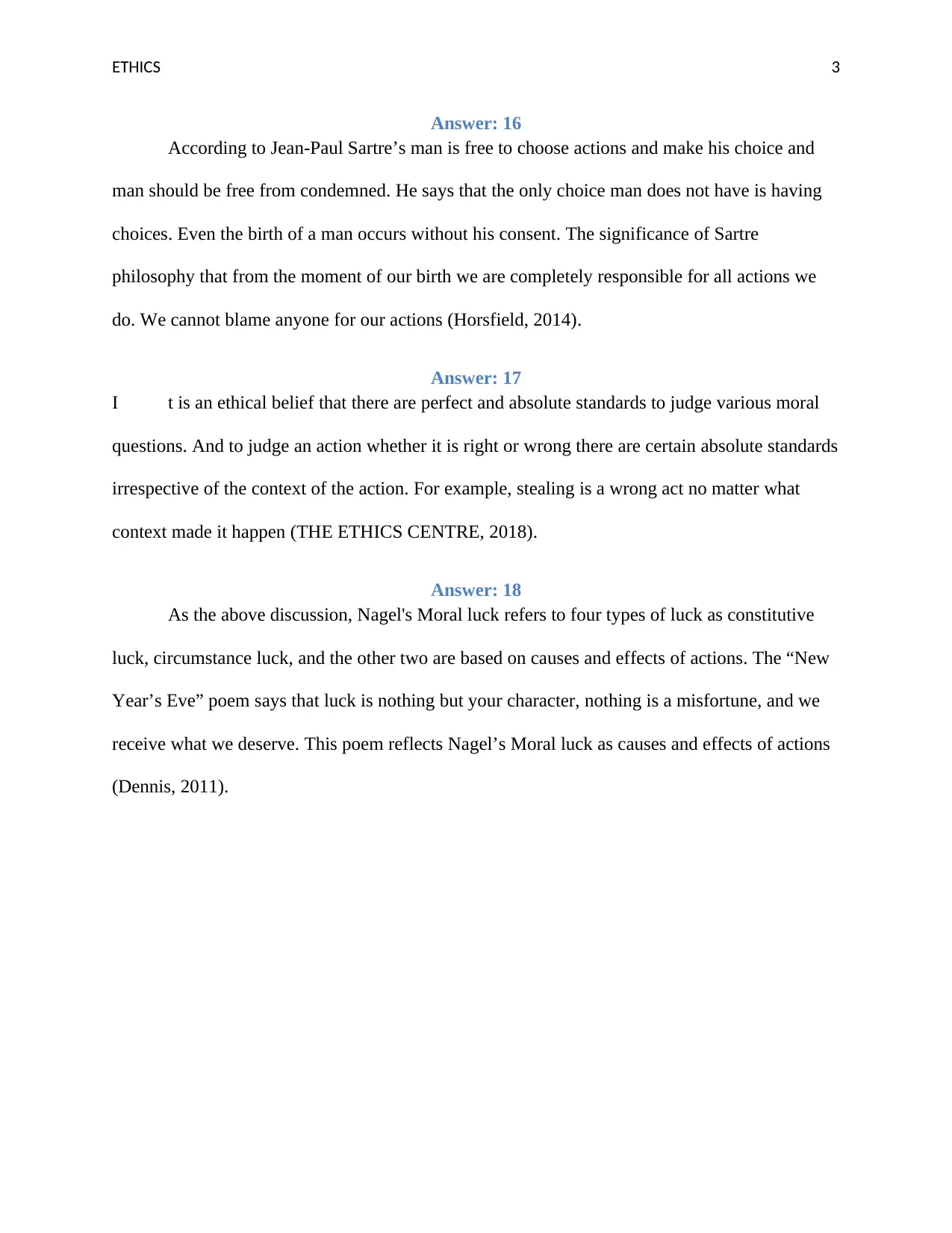
ETHICS 3
Answer: 16
According to Jean-Paul Sartre’s man is free to choose actions and make his choice and
man should be free from condemned. He says that the only choice man does not have is having
choices. Even the birth of a man occurs without his consent. The significance of Sartre
philosophy that from the moment of our birth we are completely responsible for all actions we
do. We cannot blame anyone for our actions (Horsfield, 2014).
Answer: 17
I t is an ethical belief that there are perfect and absolute standards to judge various moral
questions. And to judge an action whether it is right or wrong there are certain absolute standards
irrespective of the context of the action. For example, stealing is a wrong act no matter what
context made it happen (THE ETHICS CENTRE, 2018).
Answer: 18
As the above discussion, Nagel's Moral luck refers to four types of luck as constitutive
luck, circumstance luck, and the other two are based on causes and effects of actions. The “New
Year’s Eve” poem says that luck is nothing but your character, nothing is a misfortune, and we
receive what we deserve. This poem reflects Nagel’s Moral luck as causes and effects of actions
(Dennis, 2011).
Answer: 16
According to Jean-Paul Sartre’s man is free to choose actions and make his choice and
man should be free from condemned. He says that the only choice man does not have is having
choices. Even the birth of a man occurs without his consent. The significance of Sartre
philosophy that from the moment of our birth we are completely responsible for all actions we
do. We cannot blame anyone for our actions (Horsfield, 2014).
Answer: 17
I t is an ethical belief that there are perfect and absolute standards to judge various moral
questions. And to judge an action whether it is right or wrong there are certain absolute standards
irrespective of the context of the action. For example, stealing is a wrong act no matter what
context made it happen (THE ETHICS CENTRE, 2018).
Answer: 18
As the above discussion, Nagel's Moral luck refers to four types of luck as constitutive
luck, circumstance luck, and the other two are based on causes and effects of actions. The “New
Year’s Eve” poem says that luck is nothing but your character, nothing is a misfortune, and we
receive what we deserve. This poem reflects Nagel’s Moral luck as causes and effects of actions
(Dennis, 2011).
Paraphrase This Document
Need a fresh take? Get an instant paraphrase of this document with our AI Paraphraser
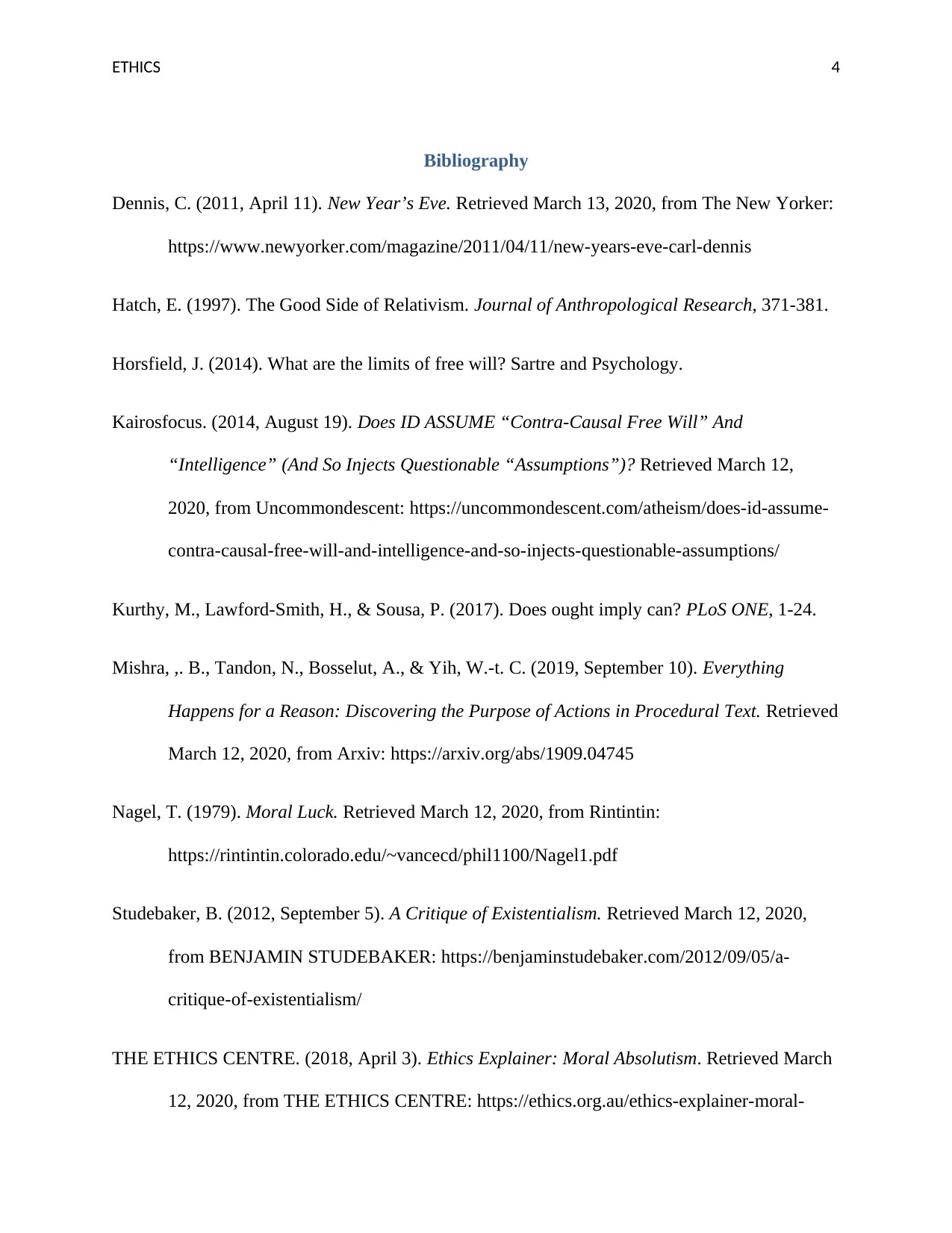
ETHICS 4
Bibliography
Dennis, C. (2011, April 11). New Year’s Eve. Retrieved March 13, 2020, from The New Yorker:
https://www.newyorker.com/magazine/2011/04/11/new-years-eve-carl-dennis
Hatch, E. (1997). The Good Side of Relativism. Journal of Anthropological Research, 371-381.
Horsfield, J. (2014). What are the limits of free will? Sartre and Psychology.
Kairosfocus. (2014, August 19). Does ID ASSUME “Contra-Causal Free Will” And
“Intelligence” (And So Injects Questionable “Assumptions”)? Retrieved March 12,
2020, from Uncommondescent: https://uncommondescent.com/atheism/does-id-assume-
contra-causal-free-will-and-intelligence-and-so-injects-questionable-assumptions/
Kurthy, M., Lawford-Smith, H., & Sousa, P. (2017). Does ought imply can? PLoS ONE, 1-24.
Mishra, ,. B., Tandon, N., Bosselut, A., & Yih, W.-t. C. (2019, September 10). Everything
Happens for a Reason: Discovering the Purpose of Actions in Procedural Text. Retrieved
March 12, 2020, from Arxiv: https://arxiv.org/abs/1909.04745
Nagel, T. (1979). Moral Luck. Retrieved March 12, 2020, from Rintintin:
https://rintintin.colorado.edu/~vancecd/phil1100/Nagel1.pdf
Studebaker, B. (2012, September 5). A Critique of Existentialism. Retrieved March 12, 2020,
from BENJAMIN STUDEBAKER: https://benjaminstudebaker.com/2012/09/05/a-
critique-of-existentialism/
THE ETHICS CENTRE. (2018, April 3). Ethics Explainer: Moral Absolutism. Retrieved March
12, 2020, from THE ETHICS CENTRE: https://ethics.org.au/ethics-explainer-moral-
Bibliography
Dennis, C. (2011, April 11). New Year’s Eve. Retrieved March 13, 2020, from The New Yorker:
https://www.newyorker.com/magazine/2011/04/11/new-years-eve-carl-dennis
Hatch, E. (1997). The Good Side of Relativism. Journal of Anthropological Research, 371-381.
Horsfield, J. (2014). What are the limits of free will? Sartre and Psychology.
Kairosfocus. (2014, August 19). Does ID ASSUME “Contra-Causal Free Will” And
“Intelligence” (And So Injects Questionable “Assumptions”)? Retrieved March 12,
2020, from Uncommondescent: https://uncommondescent.com/atheism/does-id-assume-
contra-causal-free-will-and-intelligence-and-so-injects-questionable-assumptions/
Kurthy, M., Lawford-Smith, H., & Sousa, P. (2017). Does ought imply can? PLoS ONE, 1-24.
Mishra, ,. B., Tandon, N., Bosselut, A., & Yih, W.-t. C. (2019, September 10). Everything
Happens for a Reason: Discovering the Purpose of Actions in Procedural Text. Retrieved
March 12, 2020, from Arxiv: https://arxiv.org/abs/1909.04745
Nagel, T. (1979). Moral Luck. Retrieved March 12, 2020, from Rintintin:
https://rintintin.colorado.edu/~vancecd/phil1100/Nagel1.pdf
Studebaker, B. (2012, September 5). A Critique of Existentialism. Retrieved March 12, 2020,
from BENJAMIN STUDEBAKER: https://benjaminstudebaker.com/2012/09/05/a-
critique-of-existentialism/
THE ETHICS CENTRE. (2018, April 3). Ethics Explainer: Moral Absolutism. Retrieved March
12, 2020, from THE ETHICS CENTRE: https://ethics.org.au/ethics-explainer-moral-
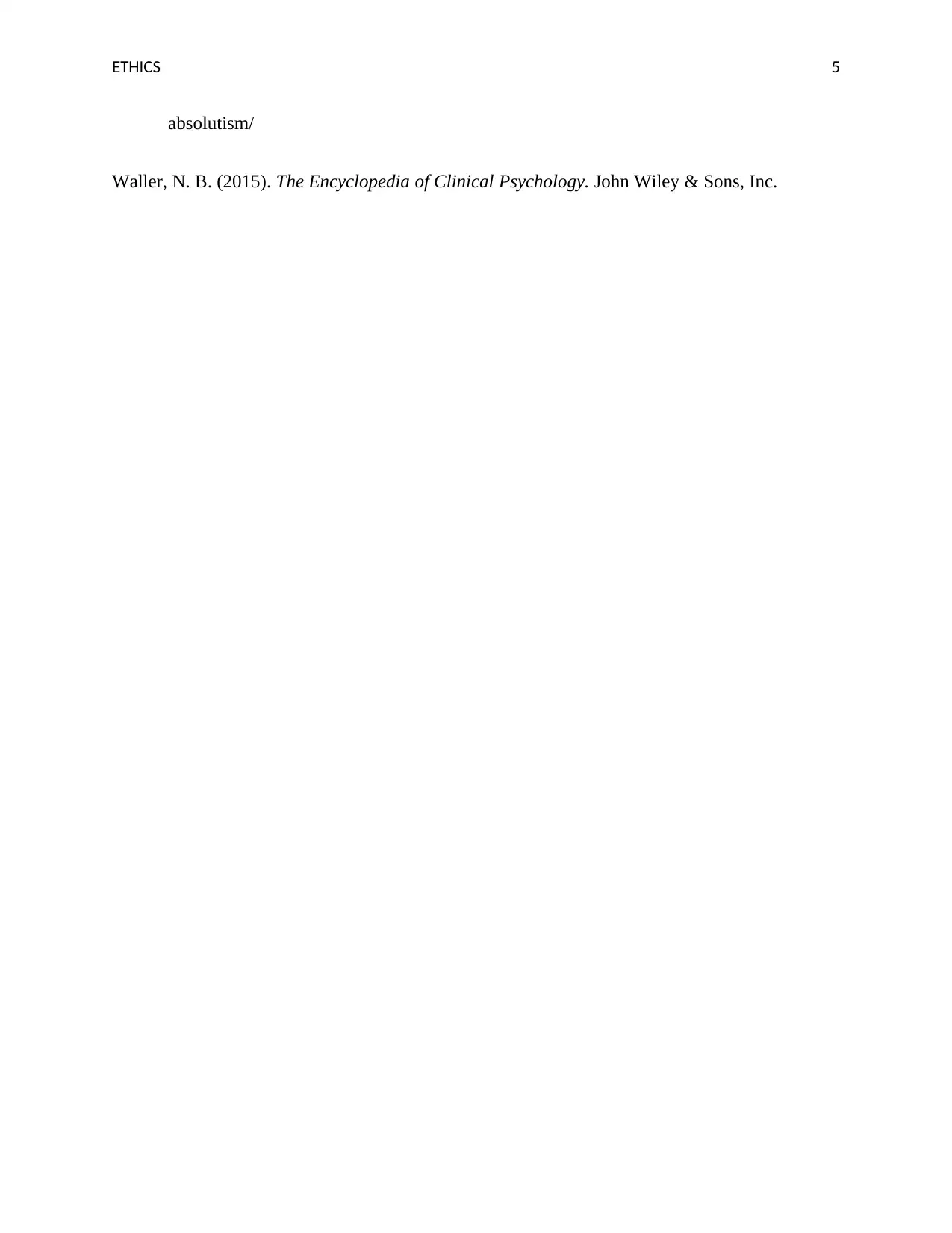
ETHICS 5
absolutism/
Waller, N. B. (2015). The Encyclopedia of Clinical Psychology. John Wiley & Sons, Inc.
absolutism/
Waller, N. B. (2015). The Encyclopedia of Clinical Psychology. John Wiley & Sons, Inc.
⊘ This is a preview!⊘
Do you want full access?
Subscribe today to unlock all pages.

Trusted by 1+ million students worldwide
1 out of 6
Your All-in-One AI-Powered Toolkit for Academic Success.
+13062052269
info@desklib.com
Available 24*7 on WhatsApp / Email
![[object Object]](/_next/static/media/star-bottom.7253800d.svg)
Unlock your academic potential
Copyright © 2020–2025 A2Z Services. All Rights Reserved. Developed and managed by ZUCOL.